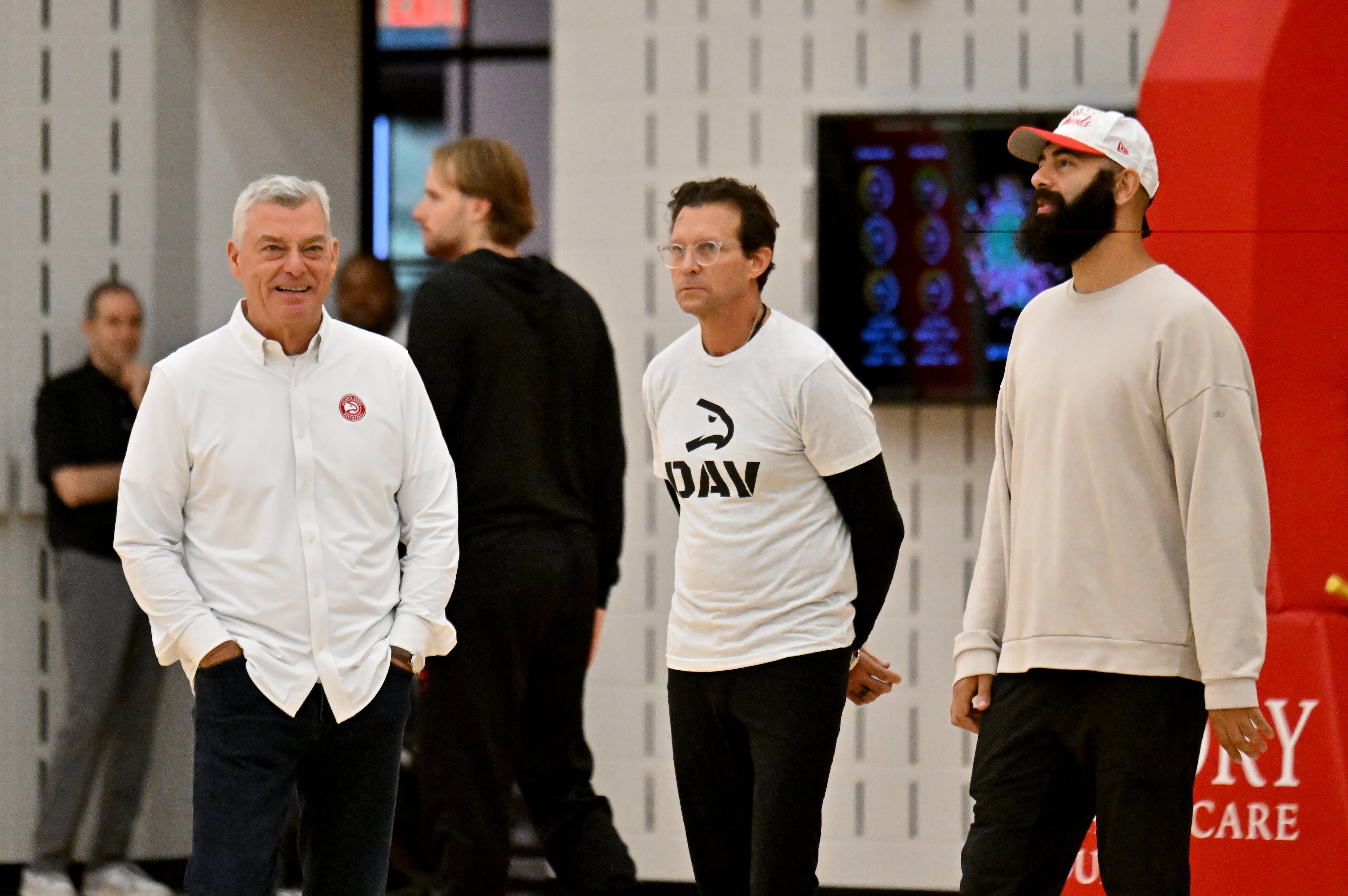Hawks’ business plan includes practice facility, renovated arena
This has been an eventful year off the court for the Hawks, bringing new owners, a revamped front office and sharp increases in season-ticket and sponsorship sales.
And as 2015 winds down, plans are emerging for more major developments ahead.
The Hawks expect to announce a site and naming-rights partner for a long-discussed practice facility in the first quarter of 2016, CEO Steve Koonin said. And efforts will continue toward a major Philips Arena renovation, with construction possibly beginning after next season, he said.
Koonin and Hawks chief revenue officer Andrew Saltzman discussed those and other topics on the team’s business side in a wide-ranging joint interview with The Atlanta Journal-Constitution.
“(2015) has been a really good year,” Koonin said.
He and Saltzman said season-ticket sales tripled, albeit from a very low level, to more than 9,000 and that 18 new corporate sponsors came on board, with deals generally in the mid to high six figures.
In a harbinger of upcoming priorities, the Hawks this month hired a new chief financial and real-estate officer, Thad Sheely, who worked on major stadium and arena projects as an executive with the New York Jets and Miami Heat. Sheely’s job description with the Hawks includes strategic leadership in construction of the practice facility and renovation of the arena.
On the practice facility, Koonin said the Hawks are “looking at multiple sites” and “talking to public officials about collaboration.” He didn’t disclose potential sites or partners. He said the plan is for the facility to be open for the 2017-18 season.
“We are going to build a state-of-the-art practice facility,” Koonin said. “We are talking with multiple medical-care providers in town about building a sports science and sports training (facility) adjacent to our 50,000-square foot practice facility.”
He noted several NBA teams have naming-rights deals with medical-care providers for their practice facilities and indicated the Hawks are moving toward something similar. The Cleveland Cavaliers train at Cleveland Clinic Courts and the Minnesota Timberwolves at The Courts at Mayo Clinic Square. The Indiana Pacers recently announced a deal with St. Vincent Hospital for naming rights on a practice facility slated to open in 2017.
“It’s an NBA trend, and it makes a whole lot of sense,” Koonin said. “It’s a wonderful way to build the brand of a health-care provider by serving the greatest athletes in the world and (saying), ‘For weekend warriors, we can do a lot for you, too.’”
The Hawks’ practice court currently is in Philips Arena, but large separate practice facilities have become the NBA norm.
“If you don’t have it, you’re at a competitive disadvantage,” Koonin said.
Meanwhile, the Hawks continue discussions with city of Atlanta officials about renovating 16-year-old, publicly owned Philips Arena.
“It is an ongoing dialogue,” Koonin said. “We don’t have a set timeline.
“We have not hammered out a deal, no, but we’re talking and working on it,” he added. “And we share a very similar vision.”
In June, on his second day as the Hawks’ primary owner, Tony Ressler told the AJC that the team would need a new arena or a renovated Philips. In October, the AJC reported city officials and the Hawks are discussing a significant overhaul of Philips to keep the team downtown, with Mayor Kasim Reed saying the renovation could cost $150 million to $250 million. How much taxpayers might contribute hasn’t been determined.
Koonin said the Hawks have hired consultants “to help us envision” what the renovations could entail.
Whatever the renovations, he said the Hawks are committed to scheduling the work in such a way that they can continue to play in the arena without interruption.
“We see doing this over summers. We’re not closing the building. We’re not going to play elsewhere,” Koonin said.
He said the planning won’t advance fast enough to begin construction next summer, but said the summer of 2017 could be a “serious” target.
The Hawks’ management is convinced the arena is in the correct location, Koonin said. He recalled that when the team was for sale early this year, one prospective purchaser posed a hypothetical to him: “Here’s a billion-dollar check. Where do you put the arena?”
“The answer is, we want to be here. We like where we are,” Koonin said. “But we are a high-paying tenant, competing against new buildings (under construction locally), competing for talent in the NBA with a lot of new buildings, and there needs to be some renovation. We want the city to do its fair share, and we plan to do ours. So it’s pretty simple.
“We’ve done no work for another site — zero. Now, I’m not going to tell you there hasn’t been every real-estate developer in town calling us.”
The biggest change on the Hawks’ business side this year came when a 19-person group led by Los Angeles-based billionaire Ressler bought the team from the previous ownership group led by Bruce Levenson. Koonin said the new owners are highly engaged but allow management to run the business day to day. Ressler’s involvement has included meeting with potential sponsors.
Among the business metrics that have risen in 2015, Koonin and Saltzman said, are merchandise sales, TV ratings and social-media engagement — all boosted by the team’s 60-win record last season and creative marketing to millennials.
Saltzman, who joined the organization in August after a long career in Atlanta sports marketing and radio, cited another measure of the Hawks’ increased prominence in the marketplace this year: “At the last Falcons game I went to, I saw seven people in Hawks gear. Two years ago, you would not have seen that.”



